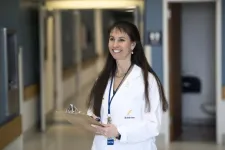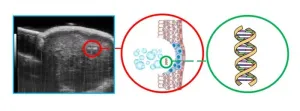(Press-News.org) An ambitious, nationwide clinical trial led by UVA Health’s Karen Johnston, MD, has provided doctors with long-needed insights into the importance of managing stroke patients’ blood sugar after treatment with clot-busting therapy. The findings will help improve stroke care and save lives.
The SHINE trial, funded by the National Institutes of Health’s National Institute of Neurological Disorders and Stroke (grant U01 NS069498), was conducted at UVA Health and 69 other hospitals around the country. The new analysis of the trial results, led by UVA Health’s Andrew Southerland, MD, found that high blood sugar shortly after thrombolysis – opening blocked arteries in the brain with a clot-busting drug – was associated with greater risk for potentially deadly brain bleeds, particularly in older patients with more severe strokes. These brain bleeds, known as symptomatic intracerebral hemorrhages, are considered one of the most dangerous complications of ischemic stroke treatment.
The trial results also suggested that intensive efforts to normalize blood sugar by aggressively administering insulin after thrombolysis was not associated with reduced risk for one of these brain bleeds. However, the researchers say that more research is needed before they could rule out the potential benefit of early insulin administration, as it may help with a “cascade of tissue injury” that can trigger an intracerebral hemorrhage.
“This is the first large-scale prospective clinical trial in stroke patients to provide data on the post-treatment effects of high blood sugar on the risk of symptomatic intracerebral hemorrhage with thrombolysis,” said Southerland, a stroke expert at UVA Health and the UVA School of Medicine. “These data suggest that more focus and research is needed on the management of high blood sugar in the treatment of stroke patients, particularly those with higher risk, more severe strokes.”
About the SHINE Trial
The Stroke Hyperglycemia Insulin Network Effort (SHINE) trial was sponsored by the National Institutes of Health and led nationally by Johnston and the UVA stroke research team. Of the 1,151 SHINE trial participants, 725, or 63%, underwent thrombolysis. Slightly more than half were men, and the median age was 65. Approximately 80% had type 2 diabetes.
Of these patients, 372 were randomly assigned to receive intensive insulin treatment, while 353 received the standard sliding scale treatment. After adjusting for variables that could influence the results, the researchers found that the intensive insulin treatment regimen used in the trial did not appear to make a difference in the risk for intracerebral hemorrhage.
They did find, however, that in the first 12 hours after thrombolysis, every 10 mg/dL increase in median blood sugar increased the odds of intracerebral hemorrhage by 8%. In addition, how long it took patients to achieve a normal blood sugar also appeared to make a difference – patients who reached a lower blood sugar (less than or equal to 180 mg/dL) sooner typically fared better.
In general, high blood sugar after thrombolysis was associated with a greater risk for a brain bleed and with poor outcomes overall, particularly in the early post-treatment period, the researchers report.
“One of the most important things patients can do to decrease their risk of stroke, particularly among diabetics, is work with their doctors and lifestyle to manage their blood sugar,” said Southerland, of UVA’s Department of Neurology. “The SHINE trial suggests that we as providers need to have a similar concern for high blood sugar after stroke treatment as we do already with other risk factors, such as high blood pressure.”
Southerland and his colleagues say that additional research is warranted to better understand how best to manage patients’ blood sugar after thrombolysis, particularly for patients who suffer more severe strokes. That research, they say, could improve outcomes and reduce the risk of intracerebral hemorrhages.
“We hope that these results will help inform future clinical trials looking at the treatment of blood sugar in higher risk patients with more severe strokes, particularly those undergoing clot removal procedures,” Southerland said. “It is exciting to be able to lead this research here at UVA, where we can work to improve stroke outcomes for our patients locally while helping move the field forward worldwide.”
Johnston, the SHINE trial leader, was pleased to see the new insights into best practices for stroke care. “These data from the SHINE trial continue to inform the national stroke community about potential approaches to treating hyperglycemic stroke patients to assure better outcomes,” she said. “With more and more patients now getting lifesaving acute stroke interventions, Dr. Southerland’s discovery suggests that this patient population warrants further study to determine the risks and benefits of glucose control. This work aligns beautifully with the new UVA Precision Health for Populations effort.”
Findings Published
The researchers have published their findings in the scientific journal Neurology. The paper’s authors were Southerland, Stephan A. Mayer, Nicole A. Chiota-McCollum, Ashley C. Bolte, Qi Pauls, L. Creed Pettigrew, Thomas P. Bleck, Mark R. Conaway and Johnston.
To keep up with the latest medical research news from UVA, subscribe to the Making of Medicine blog.
END
SHINE trial sheds light on deadly stroke complication
2024-05-13
ELSE PRESS RELEASES FROM THIS DATE:
SEQUOIA-HCM trial meets primary endpoint in obstructive hypertrophic cardiomyopathy
2024-05-13
Lisbon, Portugal – 13 May 2024: Even though mortality and hospitalisation rates have improved, the quality of life for those living with hypertrophic cardiomyopathy (HCM) can be compromised with limiting symptoms such as exertional dyspnoea and decreased exercise capacity. A major cause of this in HCM patients is left ventricular outflow tract (LVOT) obstruction, which results in elevated intracardiac pressures. This study demonstrated that aficamten enhanced HCM patients’ exercise capacity with significant improvement in peak oxygen uptake (pVO2), improvement in limiting symptoms, and decreases in LVOT pressure gradients. The late breaking research ...
Exploring the effect of H2O2 eustress on individual cancer cells using hopping probe scanning ion conductance microscopy (HPICM)
2024-05-13
In a recent study published in the multidisciplinary academic journal Science Bulletin, a semi-monthly high-caliber peer-reviewed research outlet covering a broad range of natural sciences and high-tech fields, researchers from the Nano Life Science Institute (WPI-NanoLSI) at Kanazawa University utilized hopping probe scanning ion conductance microscopy (HPICM) and highly sensitive platinum-functionalized nanoelectrodes to conduct an in-depth investigation of the dynamic response of individual living colorectal cancer Caco-2 cells to changes ...
European Society of Endocrinology and Endocrine Society publish Joint Guideline on glucocorticoid-induced adrenal insufficiency (GC-AI)
2024-05-13
European Society of Endocrinology and Endocrine Society publish Joint Guideline on Glucocorticoid-induced Adrenal Insufficiency (GC-AI)
As focal points for endocrinology and hormone research, both the European Society of Endocrinology (ESE) and the Endocrine Society (ES) regularly produce clinical guidelines with recommendations for patient care, either in collaboration with other Societies or independently. Guideline development at each society is overseen by a Clinical Committee, and all guidelines are subject to a rigorous review process before ...
Endocrine Society and European Society of Endocrinology publish joint guideline on glucocorticoid-induced adrenal insufficiency
2024-05-13
WASHINGTON—The joint guideline is designed to help clinicians manage patients who have, or are at risk of developing, glucocorticoid-induced adrenal insufficiency. At least 1% of the global population uses chronic glucocorticoid therapy as anti-inflammatory or immune-suppressive agents.
The guideline, titled “Diagnosis and Therapy of Glucocorticoid-induced Adrenal Insufficiency,” will appear in the May 2024 issues of the Societies’ respective journals, The Journal of Clinical Endocrinology & Metabolism and the European Journal of Endocrinology. ...
Some varieties of annual flowers have a place in pollinator-friendly gardens
2024-05-13
Annapolis, MD; May 13, 2024—While wildflowers and perennials are a must for supporting pollinators, there's no denying the popularity of many annual flowers for their colorful, visual appeal. Annuals are often thought of as pollinator "deserts," but a new study suggests choosing the right varieties can give annual flowers a role in nourishing bees and other pollinating insects in home gardens.
In a two-year study, researchers at Michigan State University observed pollinators visiting 25 different varieties, or cultivars, of the six most popular annual ...
Plant virus treatment shows promise in fighting metastatic cancers in mice
2024-05-13
An experimental treatment made from a plant virus is effective at protecting against a broad range of metastatic cancers in mice, shows a new study from the University of California San Diego.
The treatment, composed of nanoparticles fashioned from the cowpea mosaic virus—a virus that infects black-eyed pea plants—showed remarkable success in improving survival rates and suppressing the growth of metastatic tumors across various cancer models, including colon, ovarian, melanoma and breast cancer. Similar outcomes were also observed when the treatment was administered to mice whose tumors were surgically removed.
The findings were published recently in Advanced Science.
The ...
SwRI studies boiling processes in partial gravity aboard parabolic flights
2024-05-13
SAN ANTONIO — May 13, 2024 —Southwest Research Institute is studying the process of boiling liquids under partial gravity conditions in a series of parabolic flights. The internally funded project, conducted in collaboration with Texas A&M University, aims to better understand how liquids boil on different surfaces in partial gravity. Boiling liquids will likely be required during future extended space missions to the Moon or Mars to support surface power, life support systems, cryogenic fuel production and in situ resource utilization.
“We ...
Prostate cancer study: More health benefits from plant-based diet
2024-05-13
Men with prostate cancer could significantly reduce the chances of the disease worsening by eating more fruits, vegetables, nuts, and olive oil, according to new research by UC San Francisco.
A study of more than 2,000 men with localized prostate cancer found that eating a primarily plant-based diet was associated with a 47% lower risk that their cancer would progress, compared with those who consumed the most animal products.
This amounted to eating just one or two more servings per day of healthy foods, particularly vegetables, fruits, and whole grains, while eating fewer animal products, like dairy and meat. The study followed ...
When consumers would prefer a chatbot over a person
2024-05-13
COLUMBUS, Ohio – Actually, sometimes consumers don’t want to talk to a real person when they’re shopping online, a new study suggests.
In fact, what they really want is a chatbot that makes it clear that it is not human at all.
In a new study, researchers at The Ohio State University found that people preferred interacting with chatbots when they felt embarrassed about what they were buying online – items like antidiarrheal medicine or, for some people, skin care products.
“In general, research shows people would rather interact with a human customer ...
Intense ultrasound extracts genetic info for less invasive cancer biopsies #ASA186
2024-05-13
OTTAWA, Ontario, May 13, 2024 – Ultrasound imaging offers a valuable and noninvasive way to find and monitor cancerous tumors. However, much of the most crucial information about a cancer, such as specific cell types and mutations, cannot be learned from imaging and requires invasive and damaging biopsies. One research group developed a way to employ ultrasound to extract this genetic information in a gentler way.
At the University of Alberta, a team led by Roger Zemp explored how intense ultrasound can release biological indicators of disease, or biomarkers, from cells. These biomarkers, ...







